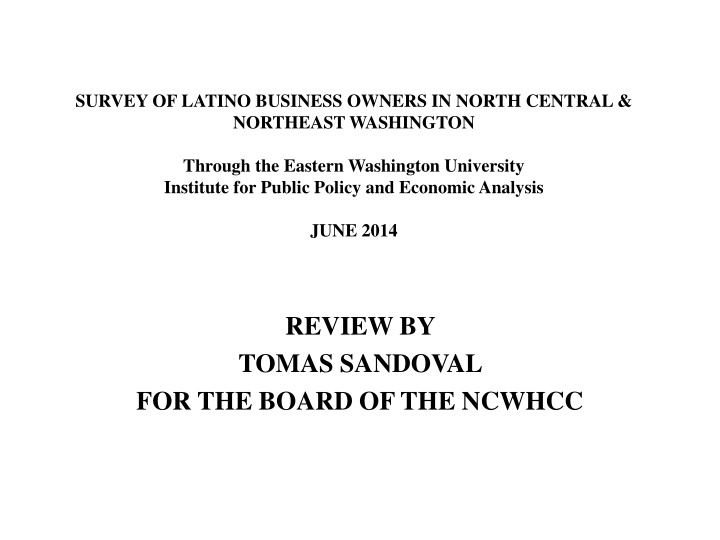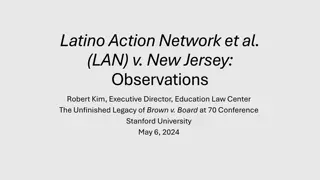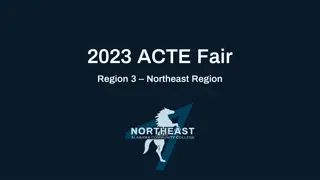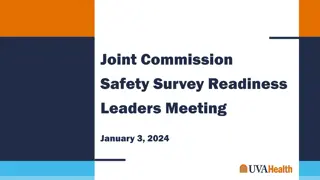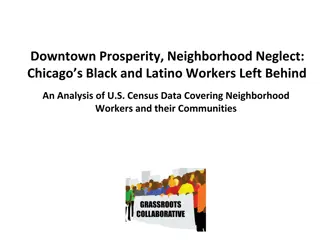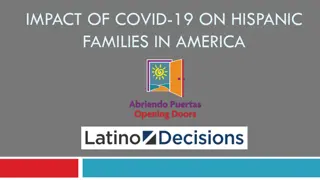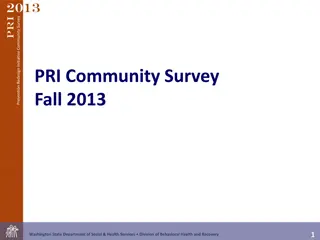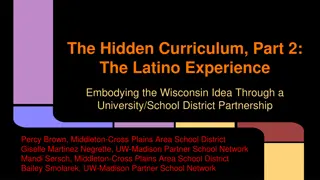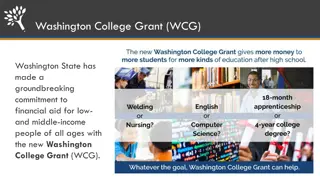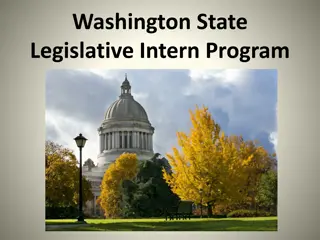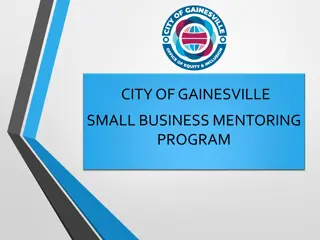Survey of Latino Business Owners in North Central & Northeast Washington
Study conducted in 2013 by Eastern Washington University analyzed the contributions of Latino business owners in Washington State. 104 businesses were contacted, with 46 interviews conducted, revealing challenges and successes faced by Latino entrepreneurs, including underrepresentation in ownership and reliance on personal savings.
Uploaded on Sep 19, 2024 | 2 Views
Download Presentation

Please find below an Image/Link to download the presentation.
The content on the website is provided AS IS for your information and personal use only. It may not be sold, licensed, or shared on other websites without obtaining consent from the author.If you encounter any issues during the download, it is possible that the publisher has removed the file from their server.
You are allowed to download the files provided on this website for personal or commercial use, subject to the condition that they are used lawfully. All files are the property of their respective owners.
The content on the website is provided AS IS for your information and personal use only. It may not be sold, licensed, or shared on other websites without obtaining consent from the author.
E N D
Presentation Transcript
SURVEY OF LATINO BUSINESS OWNERS IN NORTH CENTRAL & NORTHEAST WASHINGTON Through the Eastern Washington University Institute for Public Policy and Economic Analysis JUNE 2014 REVIEW BY TOMAS SANDOVAL FOR THE BOARD OF THE NCWHCC
EXECUTIVE SUMMARY First Study to document the contribution of Latinos as entrepreneurs, innovators & Job creators in Washington State; Study reports on findings from interviews onsite, by phone and email Latino Business Owners were interviewed Target Area location was Counties of Adams, Chelan, Douglas, Grant & Spokane; Interviews were conducted in July, August, & first part of September, 2013; Interviews were conducted by two native Spanish Speakers;
List of Latino Businesses was provided by: North Central Washington Hispanic Chamber of Commerce Supplemental list of business owners gathered through searching Websites Databases Referrals from Latino Businesses The study was based on a representative sample from every business sector under the North American Industry Classification (NAICS) & through Latino Businesses that were contacted at random often identified when staff drove to and from the interviews. There were 104 Latino Businesses contacted. There were 46 interviews conducted. The response rate was 44%. The businesses represented were: Manufacturing, Construction, Wholesale & retail trade, Agriculture, Transportation & warehousing, Finance & insurance, Information (radio, newspaper, publishing), Real estate, Professional, Scientific, Technical, & Educational Services, Accommodation, Entertainment
UNDERREPRESENTED The broad range of Latino businesses proportionate to their population are UNDERREPRESENTED in business ownership as high as 42%. Educations & Economic levels of these owners were a broad range from middle income, college education, to humble beginnings with little to no education. Some business owners were first generation immigrants. They represented 65% of the overall sample. Second & Third generations represented the remaining 35%. Some businesses started working as laborers. Others entrepreneurs built their businesses from the ground up.
WITHOUT ASSISTANCE Economically, these businesses had a 61% of their work force as full time. 87% of these Latino Entrepreneurs started their own business using their own personal savings WITHOUT ASSISTANCE from financial institutions. During 2008, during the Great Recession, approximately 75% of Latino Entrepreneurs experienced revenue increases ranging from zero to 60%. Overall, Latinos Entrepreneurs managed a steady growth in the numbers of employees hired and business growth. A stereotype is that Latinos take advantage of governmental services BUT 95% of Latino business owners DID NOT take advantage of assistance offered by government or other community organizations.
Negative stereotypes 78% of Latino businesses interviewed purchased over 80% of their supplies from non-Hispanic customers (suppliers) and almost 40% of their clientele being non-Hispanic. 65% of Latino entrepreneurs regard the political climate in the state of Washington as indifferent and antagonistic for their business. Negative stereotypes of Latinos amongst the dominate group were cited as a factor that was making the growth of their business more challenging. Immigration issues were a key amongst Latino business owners that were interviewed. An Antidote from a Latino Business owner shared that more than 40% of its tax returns were from undocumented clients showing they were contributing to the community.
Latino Entrepreneurs Said Latino Entrepreneurs said: Lack of access to capital from financial institutions, excessive regulations, lack of training & orientation by local organizations are factors that stalled their business growth. The passage of any reforms (access to capital, excessive regulations) would be positive to their growth. NCWHCC & Wenatchee Valley Chamber of Commerce purpose is defined as - to assist small business owners grow in their business. Barriers that limited the growth of their business were the lack of education, implementation of technology into their business and language barrier. Strong Latino Republicans stated they disagree with their party position on immigration because it had a negative impact on their business.
Perceived Need Latino Business Owners perceived the need for an educated work force with bilingual and bicultural skills to take advantage of opportunities for business growth in the Health, Education, Legal, Translation, Home purchasing and Service industry. Also, Latino Business Owners perceive the need for greater access to capital for Latino Business Owners to expand or start new business was critical. It is perceived that New Latino business growth will comes as a result of: Additional training and education, Additional language skills, Implementation of new technology, Creative Marketing, Health services.
Population is a major factor USA US 2000 Census states that Latinos are the fastest growing minority group in the region and the United States which currently is 53 million or 17% nationally. Washington State About 790,000 Latinos live in the state or 12% of the population. Adams County In 2000 the Latino population was 7,732 or 47%. By 2010 the Latino population (11,099) passed the size of the Anglo population to a total of 59%. Chelan County In 2000, the Latino population was 12,831 or 19%. By 2010, the Latino population grew to 18,713 or 26%. Douglas County In 2000, the Latino population was 6,433 or 20%. By 2010, the Latino population grew to 11,013 or 29%. Grant County In 2000, the Latino population was 22,476 or 30%. By 2010, the Latino population grew to 34,163 or 38%. Grant County had the largest Latino population within this study. Spokane County In 2000, the Latino population was 11,561 or 3%. By 2010, the Latino population grew to 21,260 or 5% based on the US Census in 2013.
RESULTS The report broke down the results into the Socio-Economic Characteristics of the Five Counties Adams Latino businesses owned sample of 37% in the report Foreign born population was 24.6% 23.1% Living below the poverty level Per capita income of $37,357 (2012) 50% population speaking another language other than English 66% of the adult population had a High school education 12% of the adult population had a Bachelor s degree or higher Chelan largest number of Latino businesses owned sample of 48% in the report Foreign born population was 12% (2012) With 14.4% Living below the poverty level Per capita income of $39,797 (2012) 23.1% population speaking another language other than English 83.7% of the adult population had a High school education 20.6% of the adult population had a Bachelor s degree or higher
RESULTS - Continued Douglas largest number of Latino businesses owned sample of 48% in the report Foreign born population was 16.1% 16.4% Living below the poverty level Per capita income of $31,954 27.3% population speaking another language other than English 80.5% of the adult population had a High school education 17.4% of the adult population had a Bachelor s degree or higher Grant Latino businesses owned sample of 37% in the report Foreign born population was 19.5% 19.2% Living below the poverty level Per capita income of $32,342 (2012) _unreported___% population speaking another language other than English _unreported____% of the adult population had a High school education _unreported____% of the adult population had a Bachelor s degree or higher Spokane Latino businesses owned sample of 15% in the report Foreign born population was 5.2% 15.9% Living below the poverty level Per capita income of $37,653 8.1% population speaking another language other than English 92.6% of the adult population had a High school education 27.4% of the adult population had a Bachelor s degree or higher
DISCUSSIONS AND CONCLUSIONS It is evident that significant progress needs to be made in the services being offered by government, non-profits and profit organizations charged with assisting Latino entrepreneurs. Policy makers should be concerned that 65% of Latino entrepreneurs have never contributed nor participated in any political campaign in the state. Latino entrepreneurs believe adopting policies that are friendly to the undocumented brings important economic benefits to the state. 97% among Latino entrepreneurs believe that a passage of an immigration reform was critical for the growth of their business. Latino entrepreneurs are concentrated in the service economy; very few have entered the manufacturing sector of the economy. Policy makers can create opportunities that would encourage Latino entrepreneurs to penetrate this industry sector by making loans more accessible, providing training and information for Latino entrepreneurs. Latino entrepreneurs are still grossly underrepresented in most business sectors in all 5 counties (Adams, Chelan, Douglas, Grant, Spokane) Adams - 59% Latino population but only 16.3 owned by Latinos, Grant - 39.2% Latino population but only 10.9 owned by Latinos, Douglas - 29.5% Latino population but only 8.4 owned by Latinos, Chelan - 26% Latino population but only 3.6. owned by Latinos, Spokane - 5% Latino population but only 1.2 owned by Latinos, The business sector with the highest (91%) share of full time employment was retail trade; Latino Entrepreneurs owned firms in business sectors that are the most vulnerable to the downturns of the economy;
Latinos entrepreneurs in the information and media industry continue to struggle to make significant inroads in firm ownership & funding & opportunities; Profit and productivity could greatly improve with more education, training, and the use of technology to run their businesses. This point was confirmed by another study, Davila and Mora 2013 showing a profit increase of 50%; Latino Entrepreneurs make a significant contribution to the Washington State economy, they can be increase quickly if Latinos are provided with tools and opportunities needed to open up businesses; Important to note, that 21.7% of Latina entrepreneurs own businesses in these five counties which is behind the national average of 34.9% of women owned businesses.
Sandoval Analysis Sandoval Recommendations All financial institutions that are licensed in Washington state must ensure the inclusion of Latinos businesses, continuing and start-up, in the lending policies; Latino Hispanic Chambers (Eastern & Western Washington) must be involved with Washington State Government to oversee business policies that allow Latinos, existing businesses and start-up entrepreneurs access to financial resources and services; The NCWHCC shall meet with: Washington State Governor Jay Inslee & his staff & cabinet agencies to begin oversight activities; State Senators Murray (D), Cantwell (D) &, Representative Reichert (R), State Senator Parlette (R), Representative Hawkins (R) & Condotta (R) to ensure National & State involvement & support; Chelan County Commissioners, City of Wenatchee and the Wenatchee Valley Chamber of Commerce to improve working relations & secure funds for training, assessment, support of continuing and start-up businesses. National, state, & local financial institutions (banks and credit unions) to secure funds for training, assessment, support of continuing and start-up businesses.
ACTION STEPS Governor direction Governor policy course Oversight/ Coordination by the Governor s Office for Regulatory Innovation and Assistance
